The Human Condition Some contemplations about the


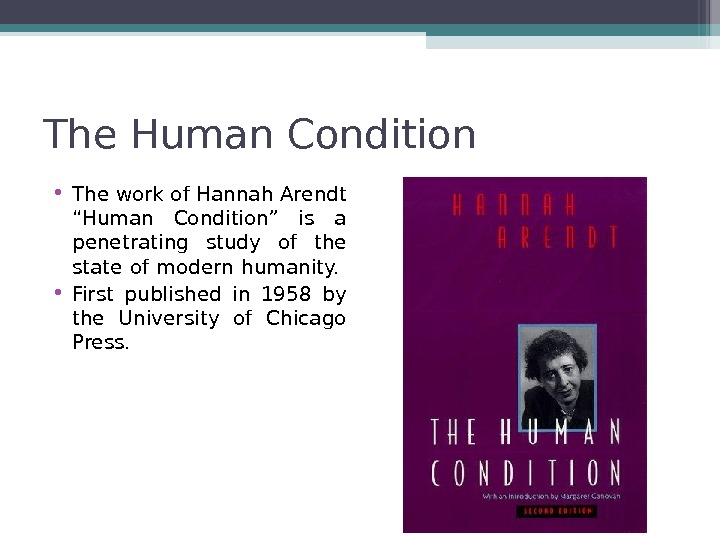

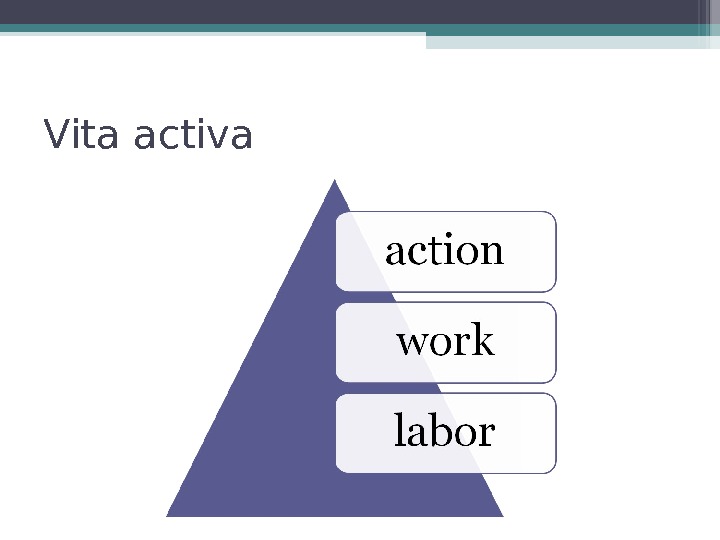

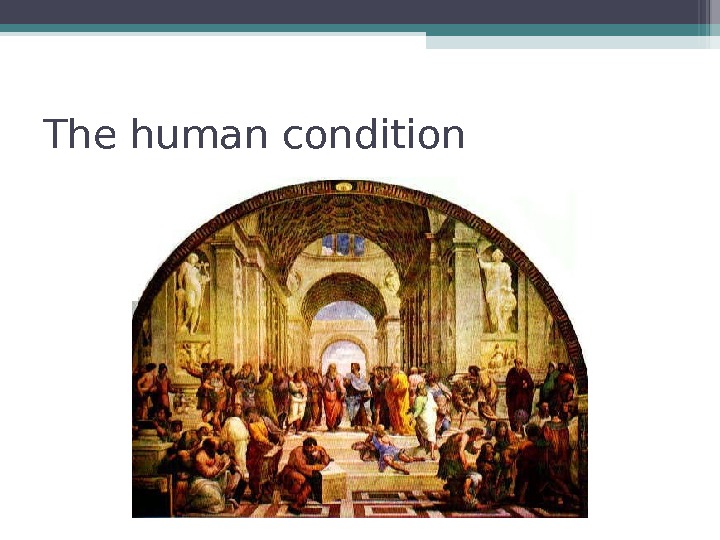
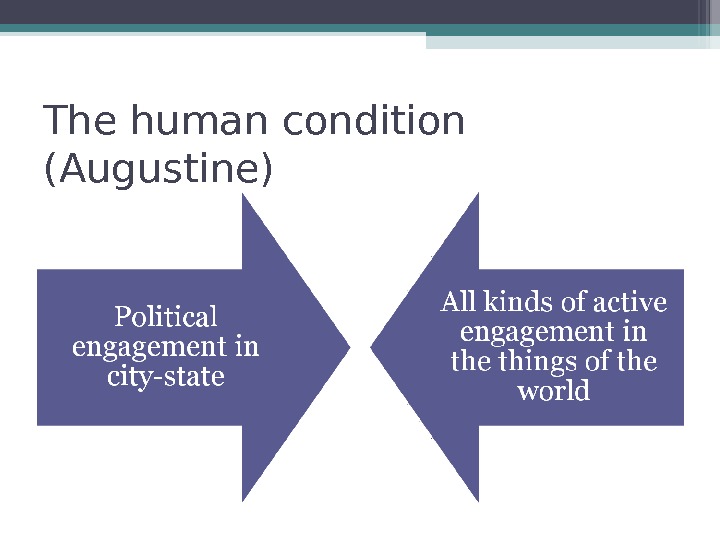



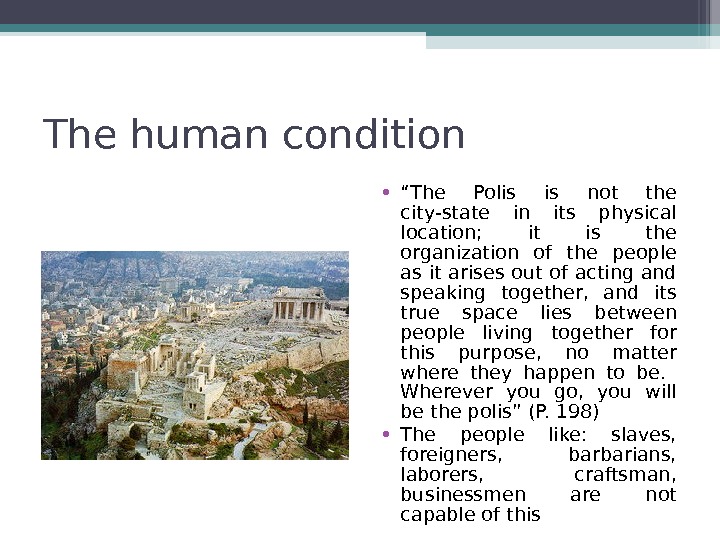

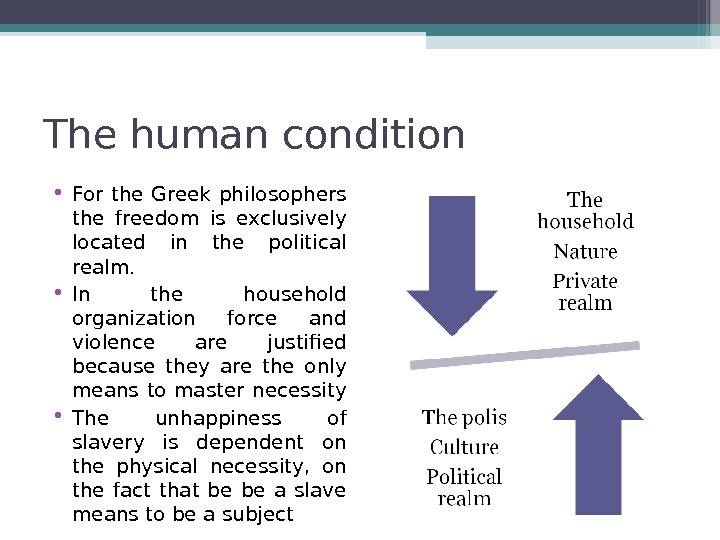

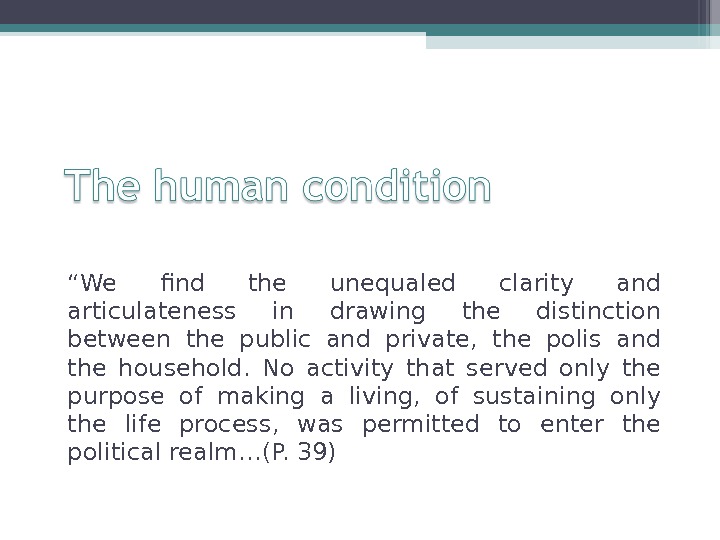


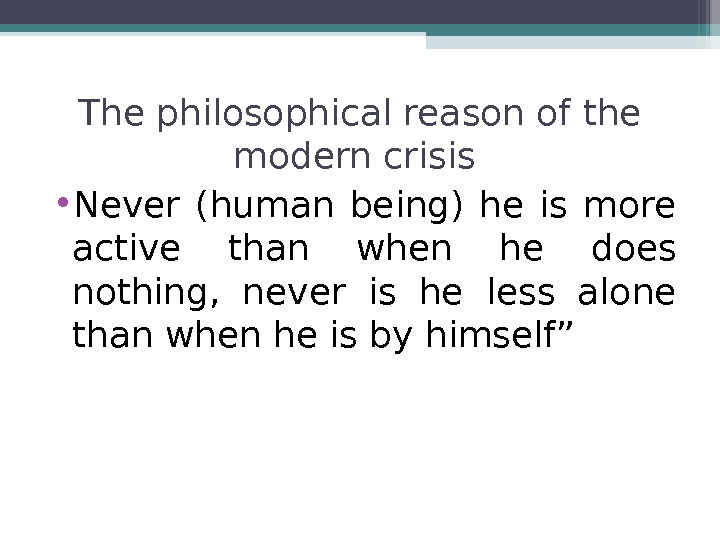


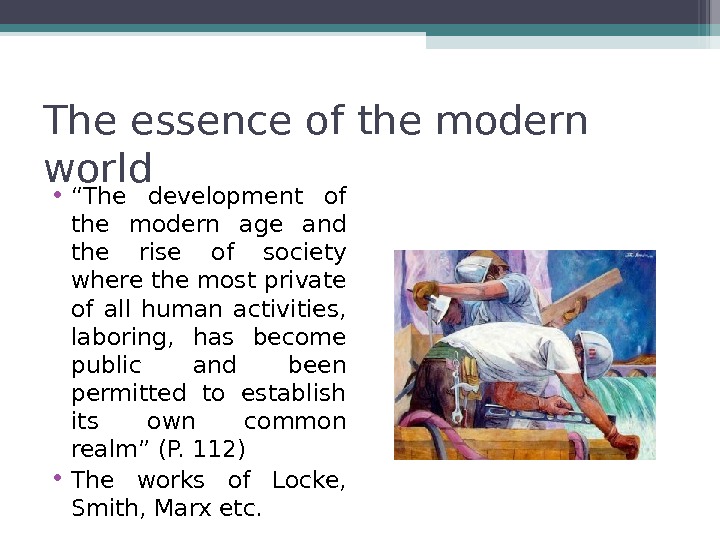



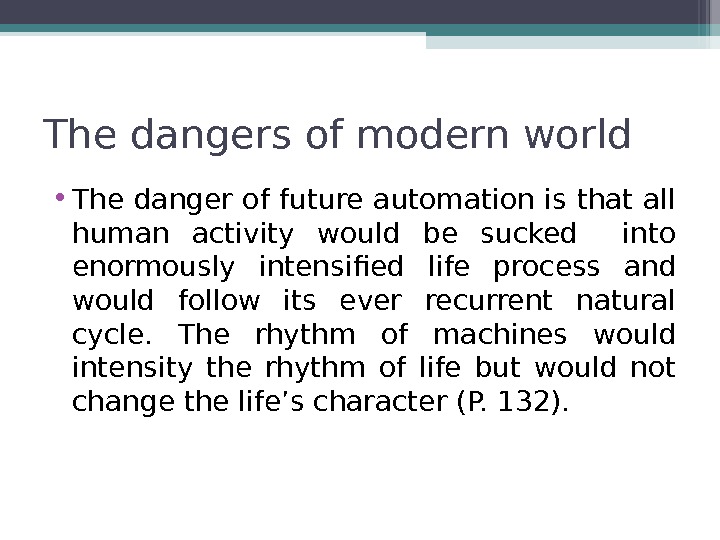


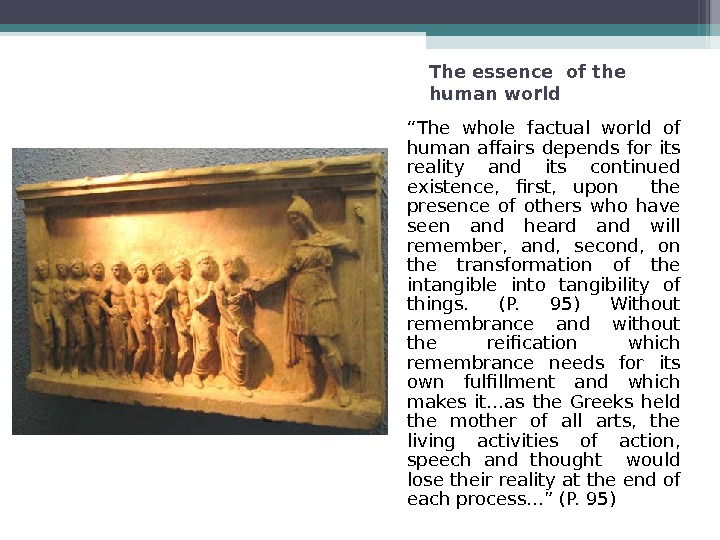
does_culture_matter_in_civil_society_3-.ppt
- Размер: 1.3 Mегабайта
- Количество слайдов: 28
Описание презентации The Human Condition Some contemplations about the по слайдам
 The Human Condition Some contemplations about the contemporary human being
The Human Condition Some contemplations about the contemporary human being
 The Human Condition • The work of Hannah Arendt “Human Condition” is a penetrating study of the state of modern humanity. • First published in 1958 by the University of Chicago Press.
The Human Condition • The work of Hannah Arendt “Human Condition” is a penetrating study of the state of modern humanity. • First published in 1958 by the University of Chicago Press.
 The human condition – Vita Activa • The problem of human nature, the Augustinian “A question have I become for myself”, seems unanswerable in both individual psychological sense and general philosophical sense. • Who am I? • What am I? • The conditions of human existence – life itself, natality, mortality, worldliness, plurality, the earth can never explain what we are and who we are ( H. c. P. 11) • “ Vita Activa” is a life devoted to public-political matters (Aristotle) • Aristotle distinguished three ways of life that is beautiful: • The life of enjoying bodily pleasures, in which the beautiful, as it is given, is consumed; • The life devoted to the matters of polis, in which excellence produces beautiful deeds; • The life of philosopher devoted to inquiry, contemplations, whose overlasting beauty can neither be brought through producing . . nor changed through consumption (P. 13)
The human condition – Vita Activa • The problem of human nature, the Augustinian “A question have I become for myself”, seems unanswerable in both individual psychological sense and general philosophical sense. • Who am I? • What am I? • The conditions of human existence – life itself, natality, mortality, worldliness, plurality, the earth can never explain what we are and who we are ( H. c. P. 11) • “ Vita Activa” is a life devoted to public-political matters (Aristotle) • Aristotle distinguished three ways of life that is beautiful: • The life of enjoying bodily pleasures, in which the beautiful, as it is given, is consumed; • The life devoted to the matters of polis, in which excellence produces beautiful deeds; • The life of philosopher devoted to inquiry, contemplations, whose overlasting beauty can neither be brought through producing . . nor changed through consumption (P. 13)
 Vita activa
Vita activa
 The human condition – “not to cease to be among men”
The human condition – “not to cease to be among men”
 The human condition
The human condition
 The human condition (Augustine)
The human condition (Augustine)
 The human condition The vita activa , the human life is actively engaged in doing something, is always rooted in a world of men, of manmade things. . All human activities are conditioned by the fact that men live together. . Man is by nature political, that is social (Thomas Aquinas)
The human condition The vita activa , the human life is actively engaged in doing something, is always rooted in a world of men, of manmade things. . All human activities are conditioned by the fact that men live together. . Man is by nature political, that is social (Thomas Aquinas)
 The human condition
The human condition
 The human condition
The human condition
 The human condition • “ The Polis is not the city-state in its physical location; it is the organization of the people as it arises out of acting and speaking together, and its true space lies between people living together for this purpose, no matter where they happen to be. Wherever you go, you will be the polis” (P. 198) • The people like: slaves, foreigners, barbarians, laborers, craftsman, businessmen are not capable of this
The human condition • “ The Polis is not the city-state in its physical location; it is the organization of the people as it arises out of acting and speaking together, and its true space lies between people living together for this purpose, no matter where they happen to be. Wherever you go, you will be the polis” (P. 198) • The people like: slaves, foreigners, barbarians, laborers, craftsman, businessmen are not capable of this
 The human condition • Everybody who is outside polis- slaves and barbarians – are “ aneou logou” , deprived of the faculty of speech, of the way of life in which speech and only speech made sense and where the central concern of all citizens was to talk with each other (P. 27).
The human condition • Everybody who is outside polis- slaves and barbarians – are “ aneou logou” , deprived of the faculty of speech, of the way of life in which speech and only speech made sense and where the central concern of all citizens was to talk with each other (P. 27).
 The human condition • For the Greek philosophers the freedom is exclusively located in the political realm. • In the household organization force and violence are justified because they are the only means to master necessity • The unhappiness of slavery is dependent on the physical necessity, on the fact that be be a slave means to be a subject
The human condition • For the Greek philosophers the freedom is exclusively located in the political realm. • In the household organization force and violence are justified because they are the only means to master necessity • The unhappiness of slavery is dependent on the physical necessity, on the fact that be be a slave means to be a subject
 The human condition • “ The medieval concept of the “common good, ” far from indicating the existence of a political realm, recognizes only that private individuals have interests in common, material and spiritual, and that they can retain their privacy and attend their own business only if one of them takes upon himself to look out for this common interest …”(P. 35).
The human condition • “ The medieval concept of the “common good, ” far from indicating the existence of a political realm, recognizes only that private individuals have interests in common, material and spiritual, and that they can retain their privacy and attend their own business only if one of them takes upon himself to look out for this common interest …”(P. 35).
 “ We find the unequaled clarity and articulateness in drawing the distinction between the public and private, the polis and the household. No activity that served only the purpose of making a living, of sustaining only the life process, was permitted to enter the political realm…(P. 39)
“ We find the unequaled clarity and articulateness in drawing the distinction between the public and private, the polis and the household. No activity that served only the purpose of making a living, of sustaining only the life process, was permitted to enter the political realm…(P. 39)
 The reason of the modern crisis • The decisive historical fact is that modern privacy in its most relevant function, to shelter the intimate, was discovered as the opposite not . . only of the political sphere but of the social… (P. 38) • The enlargement of the private — the obsession of the modern enchantment of small things – “petit bonheur” — space of their own four walls… between cat and dog …
The reason of the modern crisis • The decisive historical fact is that modern privacy in its most relevant function, to shelter the intimate, was discovered as the opposite not . . only of the political sphere but of the social… (P. 38) • The enlargement of the private — the obsession of the modern enchantment of small things – “petit bonheur” — space of their own four walls… between cat and dog …
 The philosophical reason of the modern crisis • The pragmatic trend of modern philosophy, characterized by the Cartesian world alienation, by the unanimity with English philosophy from the 17 th century onward and French philosophy in the 18 th century adopted the principle of as the key which will open all doors to the explanation of human motivation and behavior. The oldest conviction of homo faber that the “man is the measure of all things” advanced to the rank of a universally accepted commonplace (P. 306). • Outburst of human activity ends in sterile historic passivity (P. 322)
The philosophical reason of the modern crisis • The pragmatic trend of modern philosophy, characterized by the Cartesian world alienation, by the unanimity with English philosophy from the 17 th century onward and French philosophy in the 18 th century adopted the principle of as the key which will open all doors to the explanation of human motivation and behavior. The oldest conviction of homo faber that the “man is the measure of all things” advanced to the rank of a universally accepted commonplace (P. 306). • Outburst of human activity ends in sterile historic passivity (P. 322)
 The philosophical reason of the modern crisis • Never (human being) he is more active than when he does nothing, never is he less alone than when he is by himself”
The philosophical reason of the modern crisis • Never (human being) he is more active than when he does nothing, never is he less alone than when he is by himself”
 Philosophical reason for modern crisis – the absence:
Philosophical reason for modern crisis – the absence:
 The reason of the modern crisis • Mass phenomenon of unhuman loneliness (David Riesman) • The strong interconnection between the private realm and the “household or housekeeping”, with private property (K. Marx) • The rebellion against society (Romanticism) • The difficult relations between the private and public property (socialism, communism) (Commonwealth – common wealth)
The reason of the modern crisis • Mass phenomenon of unhuman loneliness (David Riesman) • The strong interconnection between the private realm and the “household or housekeeping”, with private property (K. Marx) • The rebellion against society (Romanticism) • The difficult relations between the private and public property (socialism, communism) (Commonwealth – common wealth)
 The essence of the modern world • “ The development of the modern age and the rise of society where the most private of all human activities, laboring, has become public and been permitted to establish its own common realm” (P. 112) • The works of Locke, Smith, Marx etc.
The essence of the modern world • “ The development of the modern age and the rise of society where the most private of all human activities, laboring, has become public and been permitted to establish its own common realm” (P. 112) • The works of Locke, Smith, Marx etc.
 The modern world
The modern world
 The modern world • The split between public and private worlds correlates with a split between utilitarian individualism, appropriate in the economic and occupational spheres, and expressive individualism, appropriate in private life. • These two spheres were clearly separated in the early XIXth century.
The modern world • The split between public and private worlds correlates with a split between utilitarian individualism, appropriate in the economic and occupational spheres, and expressive individualism, appropriate in private life. • These two spheres were clearly separated in the early XIXth century.
 The dangers of the modern world • A hundred years after Marx we know the fallacy of the hope to nourish automatically “higher activities” in labor, the spare time of the animal laborans is never spent in anything but consumption, and the more time left to him, the greedier and more craving his appetites (P. 133) • The result is the mass culture with the universal unhappiness • The animal laborans is the extent to which the whole economy has become a waste economy
The dangers of the modern world • A hundred years after Marx we know the fallacy of the hope to nourish automatically “higher activities” in labor, the spare time of the animal laborans is never spent in anything but consumption, and the more time left to him, the greedier and more craving his appetites (P. 133) • The result is the mass culture with the universal unhappiness • The animal laborans is the extent to which the whole economy has become a waste economy
 The dangers of modern world • The danger of future automation is that all human activity would be sucked into enormously intensified life process and would follow its ever recurrent natural cycle. The rhythm of machines would intensity the rhythm of life but would not change the life’s character (P. 132).
The dangers of modern world • The danger of future automation is that all human activity would be sucked into enormously intensified life process and would follow its ever recurrent natural cycle. The rhythm of machines would intensity the rhythm of life but would not change the life’s character (P. 132).
 The dangers of Homo Faber
The dangers of Homo Faber
 The world of Homo Faber
The world of Homo Faber
 The essence of the human world “ The whole factual world of human affairs depends for its reality and its continued existence, first, upon the presence of others who have seen and heard and will remember, and, second, on the transformation of the intangible into tangibility of things. (P. 95) Without remembrance and without the reification which remembrance needs for its own fulfillment and which makes it…as the Greeks held the mother of all arts, the living activities of action, speech and thought would lose their reality at the end of each process…” (P. 95)
The essence of the human world “ The whole factual world of human affairs depends for its reality and its continued existence, first, upon the presence of others who have seen and heard and will remember, and, second, on the transformation of the intangible into tangibility of things. (P. 95) Without remembrance and without the reification which remembrance needs for its own fulfillment and which makes it…as the Greeks held the mother of all arts, the living activities of action, speech and thought would lose their reality at the end of each process…” (P. 95)

